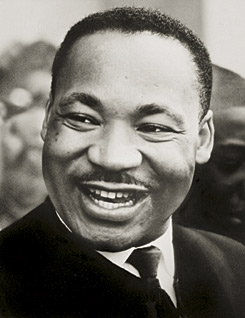
On April 3, 1968, Dr. Martin Luther King, Jr., an exemplary social justice leader, voiced a crucial message during his last public speech, "I've Been to the Mountaintop." His message links social justice to decision making and addresses the paradox of searching versus acting. Here is what Martin Luther King, Jr. shared in Memphis the day before his assassination (www.afscme.org/about/1549.cfm):
Let us develop a kind of dangerous unselfishness. One day a man came to Jesus; and he wanted to raise some questions about some vital matters in life. At points, he wanted to trick Jesus, and show him that he knew a little more than Jesus knew, and through this, throw him off base. Now that question could have easily ended up in a philosophical and theological debate. But Jesus immediately pulled that question from mid-air, and placed it on a dangerous curve between Jerusalem and Jericho. And he talked about a certain man, who fell among thieves. You remember that a Levite and a priest passed by on the other side. They didn't stop to help him. And finally a man of another race came by. He got down from his beast, decided not to be compassionate by proxy. But with him, administering first aid, and helped the man in need. Jesus ended up saying, this was the good man, this was the great man, because he had the capacity to project the 'I' into the 'thou,' and to be concerned about his brother. ... I'm going to tell you what my imagination told me. It's possible that [the Levite and the priest] were afraid. You see, the Jericho road is a dangerous road. ... Or it's possible that they felt that the man on the ground was merely faking. And he was acting like he had been robbed and hurt, in order to seize them over there, lure them there for quick and easy seizure. And so the first question that the Levite asked was, 'If I stop to help this man, what will happen to me?' But then the Good Samaritan came by. And he reversed the question: 'If I do not stop to help this man, what will happen to him?'
Personally, I see clear applications of this parable to social justice and decision making in healthcare. Healthcare is a social justice enterprise, and, at the end of the day, we all must reverse the question and ask: "If I do not stop to help this man, what will happen to him?"